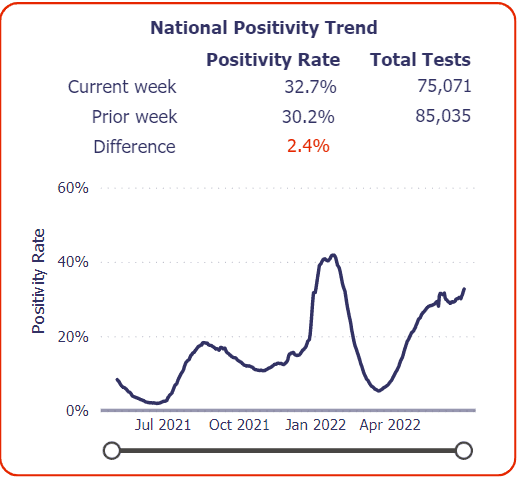by | Jul 7, 2022 | Axiom Medical, Coronavirus & COVID-19, COVID-19 Testing
In May 2022, the United States surpassed one million deaths from COVID-19. At this point, almost every American knows someone who has died from this disease. March of 2020 was a month we will not likely forget anytime soon. The SARS-CoV-2 pandemic was making headlines as it quickly spread across the globe. People were quarantined in their homes, stayed six feet away from others, and washed their hands religiously. Nobody expected the pandemic to last for over two years. Today, regulations seem more relaxed, but the virus continues to spread. Many of us are asking, “will COVID end in 2023?“
The answer is somewhat yes and no. Keep reading to learn more about what the experts are saying about the future of COVID-19.

Will COVID End in 2023?
In short, researchers are not predicting an end to COVID in 2023. In fact, the coronavirus is not likely to leave us for a very long time. But most likely, how COVID-19 affects our lives could change.
Before diving into the pandemic’s future predictions, it’s vital to assess our current state. Although news about the virus’s new variants has waned in recent months, the virus is still causing widespread illness and death across the nation and globe.

“As businesses across the world continue to adjust to the new reality forced upon them by COVID, it is clear that an effective medical surveillance is becoming a key distinguishing feature among businesses that are growing. The risk of workforce decline brought on by illness is painfully real. By investing in technologies and processes to mitigate the risk of infection, employers are in not just the team, but their own future.”
Chuck Kable
Chief Legal Officer, Axiom Medical
Current Status of COVID-19, Variants, and Vaccines
As of June 30, 2022, there have been over 87 million confirmed cases of COVID-19 in America. According to the CDC, we are still experiencing:
- Over 100,000 new COVID cases every day
- Almost 5,000 new daily hospital admissions
- An average of 321 daily deaths
With numbers like these, it’s clear that the COVID pandemic is far from over.
Vaccines and boosters for COVID have become widely available, but many Americans remain unvaccinated. Only 66% of the population is fully vaccinated, and only 33% have received at least one booster dose. Although research has proven vaccines to be safe and effective, many Americans still choose not to vaccinate for one or more of these reasons:
- Concern about vaccine side effects
- Distrust in vaccine efficacy
- No desire to maintain booster shots
- Reliant on natural immunity from infection
- “Playing the odds” on survival
- Don’t feel they are putting others at risk
- Not condoned by their religious group
- Not condoned by their political leader
- Belief in COVID or vaccine conspiracies
While everyone should have control over their health and bodies, ending a pandemic requires support from the whole society. When some people remain unvaccinated, it weakens the entire community. Variants are able to mutate and spread between the vaccinated and unvaccinated alike.
Omicron variants are incredibly infectious, albeit less deadly in general. Some viruses from the Omicron family have become resistant to current vaccines, leading infections to quadruple since April 2022. The availability of at-home test kits may mean that many cases go unreported.
How Does the National Positivity Trend Look Like Now?
While the Omicron surge took the case numbers to another level, we all experienced a sharp drop in daily cases starting this spring. However, the rate is steadily increasing, with a new strain circulating globally. In fact, the national positivity trend is going up with a 32.7% weekly positive case rate.

Is It Too Late to End COVID?
Unfortunately, COVID-19 and its variants are not likely to disappear any time soon. COVID predictions are leaning toward an endemic, meaning the virus will become familiar and seasonal like the cold or flu. COVID will probably transition from a pandemic to an endemic in 2023, which is good and bad news.
In the future endemic, weaker variants may mean fewer deaths, but the number of deaths that will still occur could be staggering. Although we consider Omicron to be less deadly, it has caused more deaths than the Delta variant. This is because Omicron spreads more rapidly.
Deaths aren’t the only negative aspect of endemic COVID. Long COVID symptoms are another severe consequence of allowing this virus to spread unchecked. Infected people who survive their illness may bear lifelong symptoms such as fatigue, headaches, and loss of smell or taste.
Although the COVID endemic predictions may feel discouraging, everyone must maintain hope and continue fighting this disease.
If Americans decide too soon that the battle with COVID is “over,” we could drag this virus with us forever. The virus may become part of our everyday lives, but limiting hospitalizations, deaths, and long COVID illness cases is still crucial.
Understanding An Endemic
Researchers predict that COVID will become endemic. The term “endemic” may seem unfamiliar to many people. After all, we don’t often describe seasonal illnesses like the cold or flu as endemic.
An endemic is a constant presence of a disease within a given population. Examples of endemic diseases include influenza, malaria, HIV, and syphilis.
Endemics are very difficult, if not impossible, to completely remove from society, but they are manageable. Awareness of the endemic disease is widespread, and most populations know what they need to do to avoid becoming ill. For example, screen doors have become very common in places where mosquitoes spread malaria.
How Do Endemics Happen?
Any pandemic can eventually become endemic, given the right components. In general, a disease needs to become highly contagious but not highly deadly. This allows the infection to spread quickly between living hosts.
Diseases like Rabies are not spread quickly, but they are deadly. The host usually dies before they can infect many other hosts. Rabies is not likely to become endemic.
On the other hand, diseases like Ebola are highly contagious and highly deadly. One host can infect many other hosts, but victims will die quickly, limiting the spread of the disease. Ebola is not likely to become endemic.
COVID, especially Omicron variants, strikes the delicate balance between contagiousness and deadliness. Omicron can spread very quickly throughout a population without killing very many people. Omicron is likely to become endemic.
Can Endemics Be Reversed?
Once a disease becomes endemic, it is likely to remain permanent in the population. Rates of infection can rise and fall, but some members of society will always be sick. Generally, endemics peak during cold seasons when people bundle up indoors.
Consider the common cold, which has been around for thousands of years. We haven’t been able to develop a vaccine or cure for colds because too many strains of viruses cause colds. If COVID variants continue to multiply, we may never find a vaccine or cure that works for every strain.
The Future of the COVID Endemic
In an endemic, the focus will be on limiting the societal damage caused by disease and preventing the spread of illness in the population.
Consider the seasonal flu, which typically peaks in colder months. Because communities recognize the pattern of flu season, we know how to take protective measures. We can control influenza endemic by washing our hands, getting a flu shot, and staying home when ill.
If COVID becomes endemic, we will likely see an increase in seasonal efforts to control the disease. For example, people may frequently wear masks during the colder months to slow COVID. Masks may also be requested or required in public transportation, business offices, and other crowded spaces.
Quarantine restrictions may also become a regular part of life for the workforce. Like staying home with the flu, staying home when you are ill with COVID will protect others from infection. It hasn’t been determined whether employers should require a negative test for employees to return to the office.
Like many people get a yearly flu shot, yearly COVID boosters could become the new normal. Boosters will be necessary to keep up with the ever-evolving strains of COVID. Ultimately, COVID may never leave us, but vaccines and masks will keep hospitalizations at bay.
Could a Pandemic Happen Again?
We are currently still in a pandemic state until COVID becomes endemic. As long as COVID trends toward less deadly variations, we will not likely see a resurgence of SARS-CoV-2 as a pandemic.
However, many researchers speculate that SARS-CoV-2 is just one wave of viruses yet to come. 75% of newly emerging diseases are zoonotic, meaning they originate in animals. The increase in worldwide meat consumption and encroachment on animal habitats have brought humans and animals closer together.
Viruses can quickly spread and mutate between humans and animals in our densely populated societies. Predictions for another, possibly deadlier pandemic are on the rise.
If COVID-19 has taught us anything, we know that swift, consistent action is necessary to stop the spread of future diseases.
Preparing for the Future
Will COVID end in 2023? In short, no; COVID will likely transition from a pandemic to an endemic and become part of our regular disease repertoire. However, vaccines still play a crucial role in limiting the hospitalizations, deaths, and damages caused by COVID.
Axiom Medical Can Help!
In uncertain times, businesses need to have reliable healthcare management. Axiom Medical is dedicated to keeping you and your employees safe and healthy, regardless of the future.
For more information about our services, call us at (281)465-7100 or click here to contact us online!

With a career focused on digital marketing, Chitra is a specialized SEO-Content marketer. After moving from biotechnology to business operations and marketing, Chitra started her digital marketing career as a freelance content developer and technical writer. With Axiom, as a content marketing & SEO specialist, she is passionate about creating informative marketing copies for optimum search engine performance.
